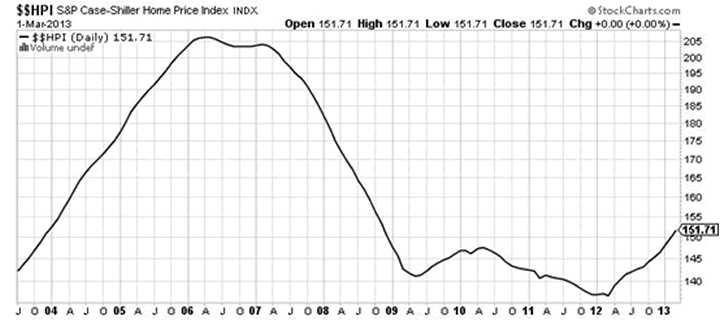How to Make the Most from the Changes in the U.S. Housing Market
Personal_Finance / US Housing Jun 27, 2013 - 04:12 PM GMTBy: DailyGainsLetter

 Moe Zulfiqar writes: The housing market in the U.S. economy has gained a significant amount of attention. Even my old friend, Mr. Speculator, who likes to make big bets for bigger gains, told me it’s a good time to buy a house, saying “the prices are cheap, and they are only going higher from here.”
Moe Zulfiqar writes: The housing market in the U.S. economy has gained a significant amount of attention. Even my old friend, Mr. Speculator, who likes to make big bets for bigger gains, told me it’s a good time to buy a house, saying “the prices are cheap, and they are only going higher from here.”
What’s certain is that the U.S. housing market has seen an uptick since the home prices hit bottom in early 2012; but is it on the path to real recovery, or is what we are seeing just a minor bounce?
Consider the chart below of the S&P/Case-Shiller Home Price Index:

Chart courtesy of www.StockCharts.com
Looking at home prices alone, they are nowhere close to being at the same level they were in 2006 and 2007. The S&P/Case-Shiller Home Price Index suggests the U.S. housing market is still down roughly 26% from its peak.
Going forward, the very factors that can drive the housing market higher are under stress, and may just divert its path to the undesired direction.
The number of first-time home buyers in the housing market has been decreasing. This shouldn’t be taken lightly, because they essentially provide liquidity to the housing market. In May 2012, they accounted for 34% of all existing home sales in the U.S. housing market; by May 2013, they had declined almost 28%. (Source: “Existing-Home Sales Rise in May with Strong Price Increases,” National Association of Realtors web site, June 20, 2013.)
Unemployment in the country is staggering. Almost 12 million Americans are out of work, and a significant portion—37.3% of them to be exact—have been unemployed for more than six months. There are another 7.9 million Americans who are working part-time because they cannot find full-time jobs. (Source: “The Employment Situation – May 2013,” Bureau of Labor Statistics web site, June 7, 2013.)
I suspect that the very consumers in the U.S. economy who have made buying a home a priority are actually struggling to keep up with their expenses. Consider this: according to a survey released by Bankrate.com, 76% of Americans live paycheck-to-paycheck., while fewer than one in four Americans have savings that can cover just six months of expenses. (Source: “76% of Americans are living paycheck-to-paycheck,” CNN Money, June 24, 2013.)
Adding fuel to the fire, since the announcement from the Federal Reserve about possibly slowing down on its purchases of government bonds and mortgage-backed securities, the U.S. bond yields have been skyrocketing. The 30-year U.S. bond yields have surpassed 3.6% and the 10-year yields have soared beyond 2.5%. Keep in mind that these bonds are used as a benchmark of where the mortgage rates will head.
And as the mortgage rates increase, it will become even more expensive for Americans to own a home.
The increase in home prices is just a small step; for a healthy housing market recovery, there needs to be buyers and sellers. But as it stands, the buyers are facing severe pressures and continuing troubles: high unemployment, rising prices, and increasing mortgage rates will make them think twice about buying a home.
If an investor believes the U.S. housing market will see a period of stress ahead, then they can profit from exchange-traded funds (ETFs) like the ProShares Short Real Estate (NYSEArca/REK) ETF.
This ETF tracks the inverse performance of the Dow Jones U.S. Real Estate Index and lets investors profit from fluctuations in companies involved in the U.S. housing market. (Source: “Short Real Estate,” ProShares web site, last accessed June 25, 2013.)
Copyright © 2013 Daily Gains Letter – All Rights Reserved
Bio: The Daily Gains Letter provides independent and unbiased research. Our goal at the Daily Gains Letter is to provide our readership with personal wealth guidance, money management and investment strategies to help our readers make more money from their investments.
Daily Gains Letter Archive |
© 2005-2022 http://www.MarketOracle.co.uk - The Market Oracle is a FREE Daily Financial Markets Analysis & Forecasting online publication.


